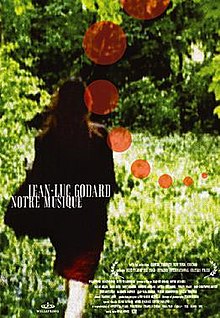Notre musique
| Notre Musique | |
|---|---|
 |
|
| Directed by | Jean-Luc Godard |
| Produced by |
Alain Sarde Ruth Waldburger |
| Written by | Jean-Luc Godard |
| Starring |
Sarah Adler Nade Dieu George Aguilar Jean-Luc Godard Rony Kramer |
| Cinematography | Jean-Christophe Beauvallet Julien Hirsch |
|
Release date
|
May 19, 2004 |
|
Running time
|
80 minutes |
| Country | France Switzerland |
| Language |
French Arabic English Hebrew Serbo-Croatian Spanish |
Notre musique (English: Our Music) is a 2004 film directed by Jean-Luc Godard. The film reflects on violence, morality, and the representation of violence in film, and touches especially on past colonialism and the current Israeli-Palestinian conflict. It was screened out of competition at the 2004 Cannes Film Festival.
Notre musique received positive reviews from critics.
The film is divided into three parts inspired by the Divine Comedy of Dante. "Realm 1: Hell" is a relatively brief, non-narrative montage composed of appropriated documentary and narrative fictional footage depicting war, carnage, and violence.
The second segment, "Realm 2: Purgatory", makes up the bulk of the film. Godard, playing himself, is waiting at the airport to depart to a European arts conference in Sarajevo. There he meets Ramos Garcia, a nationalized French Israeli, who is going to the conference as an interpreter. Ramos is looking forward to seeing his niece at the conference, Olga Brodsky, a French-speaking Jew of Russian descent. Another young woman at the conference, Judith Lerner, a journalist from Tel Aviv, visits the French ambassador and entreats him to have an on-the-record conversation about Jewish-Palestinian relations ("not a just conversation; just a conversation"). Later she interviews the poet Mahmoud Darwish, who says that the Palestinian struggle defines Israel. In between these encounters, Judith surveys the city, and visits the Mostar bridge, where she reads Emmanuel Levinas (Entre Nous).
Meanwhile, Olga attends Godard's lecture, ostensibly about the relationship between image and text. In addition to touching on a variety of other topics, Godard explains his opposition to the common cinematic trope of "shot/reverse shot," the cutting back and forth between two characters in a conversation or an exchange. Godard explains that presenting two characters in such a way, framed identically, regressively effaces their differences, and can be used as a tool of propaganda. Later Olga meets with her uncle Ramos, and discusses with him the philosophical problem of suicide.
...
Wikipedia
